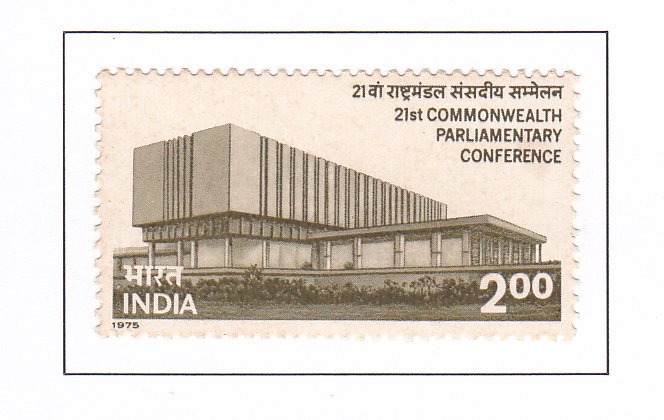21st Commonwealth Parliamentary Conference, New Delhi

Technical Data
| Date of Issue | October 28, 1975 |
|---|---|
| Denomination | Rs. 2 |
| Quantity | 3,000,000 |
| Perforation | comb 14¾ x 14 |
| Printer | Security Printing Press, Nashik |
| Watermark | No Watermark |
| Colors | Brown olive |
| Catalog Codes |
Michel IN 655 Stamp Number IN 702 Yvert et Tellier IN 458 Stanley Gibbons IN 788 |
| Themes | Buildings | Conferences | Government Buildings |
The 21st Commonwealth Parliamentary Conference took place in New Delhi from October 28 to November 4, 1975. The Commonwealth Parliamentary Association (CPA) serves as a unifying force among parliamentarians across the Commonwealth, promoting cooperation, understanding, and respect for parliamentary institutions. Established in 1911 as the Empire Parliamentary Association, it evolved into the Commonwealth Parliamentary Association in 1948, reflecting the changing nature of the Commonwealth.
The CPA consists of autonomous branches formed in legislatures across Commonwealth countries, with over 90 branches worldwide. Each branch operates independently, with affairs overseen by an Executive Committee comprising members from various political parties. The presiding officers of legislative chambers typically serve as branch presidents.
India’s involvement in the CPA dates back to its membership in the Empire Parliamentary Association, with the Central Legislative Assembly representing India until 1947. After India’s independence, it renewed its membership under the new name and constitution of the association. India hosts the main branch of the CPA at the central level, along with 19 state branches across the country.
The Commonwealth Parliamentary Association holds its plenary conference in a different Commonwealth country each year, fostering international cooperation and exchange among parliamentarians. India previously hosted the conference in 1957, and the 1975 conference marked the second time it was held in the country.
Dr. G.S. Dhillon, Member of Parliament and Speaker of the Lok Sabha, served as the President of the Commonwealth Association during the 1975 conference, presiding over the event. India took pride in hosting the conference, reflecting its commitment to parliamentary democracy and international cooperation.
In honor of the occasion, the Posts and Telegraphs Department of the Government of India issued a commemorative postage stamp on October 28, 1975, marking the inauguration of the conference.
